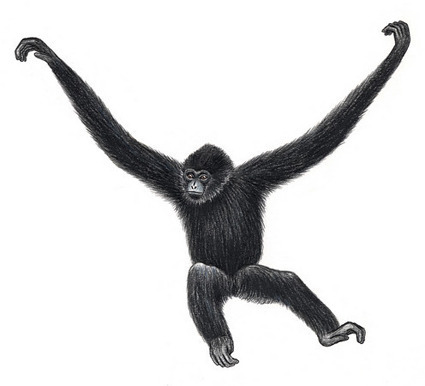Hanging on By Less Than a Thread

Cao Vit or eastern black crested gibbon (Nomascus nasutus), China and Vietnam. Illustration by Stephen D. Nash.
Nice editorial in today's Guardian (UK) about the loss of species and how it threatens our own survival. Here's an excerpt
The auguries are not good. A few weeks ago, the International Union for the Conservation of Nature confirmed the capture and subsequent death of a rare antelope from the mountains of Vietnam and Laos. This animal – Pseudoryx nghetinhensis – was discovered only in 1992 and last spotted by an automatic camera in 1999. It has, however, never been seen alive by a working zoologist. So, it has been named and pronounced critically endangered by researchers who know almost nothing about it. Researchers know a little more about the crested gibbons that live in south-east Asia. They know that there are seven species in the genus, and that one is now down to 100 individuals, and another to about 20. These species have just been declared the world's rarest apes.
The story is no happier closer to home. In March IUCN confirmed that 9% of Europe's 435 butterfly species and 11% of the saproxylic beetles that live in rotting wood are threatened with extinction, for the same reason that the crested gibbons could swing through the trees into oblivion: human pressure on habitat. Likewise, last year more than 1,200 bird species were classified by IUCN as threatened with extinction. Does it matter? Yes: civilisation is built on life's diversity. We survive only on the bounty of the living world and the rocks beneath, and even coal and oil were once living things. Biodiversity delivers fuel, fibres, fabrics, all food and most medicines: it also hums away unobserved, pollinating crops and recycling the planet's air, water and nutrients. Without the saproxylic beetles, the forests would be full of dead trees, and soon there would be no forests. So conservation is quite literally vital.











